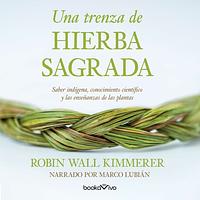Take a photo of a barcode or cover
6 stars. A beautiful, inspiring book that I wish everyone would read.
hopeful
informative
inspiring
reflective
slow-paced
Overall, I enjoyed this book and it gave me a lot to think about in regards to our relationship with the earth in a time when the ideas of gratitude, sustainability and reciprocity are sneered at and seen as antithetical to the march of capitalistic progress. Reflecting on these ideas felt like a palate cleanser in these often nasty, self-centered times. But I also struggled somewhat to get through this collection of essays, where it started to get repetitive and tread the same ground - I felt like it could have easily been edited to be 100 pages shorter and accomplished the same goal. And I am not sure what the message is in the end - there wasn't really any call to action for the reader other than general gratitude for what the earth provides, and a fantasy of the culture of greed... poisoning itself? Hmm. But I did enjoy quite a few of the individual essays, and the marrying of traditional and scientific approaches to nature.
challenging
emotional
funny
hopeful
informative
inspiring
reflective
sad
slow-paced
hopeful
informative
inspiring
reflective
relaxing
slow-paced
It’s like poetry in prose. The Figurative Language throughout makes you feel as if you are there with the author.
emotional
informative
inspiring
reflective
relaxing
slow-paced
emotional
informative
inspiring
reflective
sad
slow-paced
challenging
emotional
hopeful
inspiring
slow-paced
emotional
informative
inspiring
reflective
medium-paced
Worth the hype! I am generally a little wary of memoirs, and I was so pleasantly surprised to find that Braiding Sweetgrass reads as a collection of essays instead. While Wall Kimmerer does draw form her experiences, this collection is well-tempered by her background as a Potawatomi botanist and a poet. I found the read thought-provoking and beautiful.
hopeful
informative
inspiring
reflective
sad
slow-paced
Kimmerer manages to deliver a mix of biology and soul in her works. This was no exception. In the beginning and end sections I underlined so many quotes I thought inspiring. I do think this could have been cut down slightly.
challenging
hopeful
informative
inspiring
reflective
slow-paced
50 pages into this book, I was already raving about it and trying to find a way to describe it to my mum. Spoiler alert: it’s not an easy book to describe. It’s not that hard of a book to read because it’s absolutely fascinating and the author talks quite a lot about her life, but it encompasses *so much* that I would be hard pressed to summarize it. If I tried, it would be to say that Braiding Sweetgrass is part memoir, part essay on the intersections of Indigenous ancestral knowledge and modern science, especially botany.
Reading it is both immensely relaxing and very frustrating, because the author explains things that should be obvious to everyone, but the state of the world makes it very clear that it isn’t. While a lot of it invites us to slow down and meditate on our relationship to the land on which we live, there are a couple of harrowing chapters about the havoc wreaked by industries on ancestral forests and marshlands, because the author can hold both feelings at the same time—a deep love, reverence and gratitude for the natural world and the non-human persons inhabiting it, and a deep sadness and feeling of revolt at the damages our species is inflicting on it. The very different chapters are held together by the image of the braid of sweetgrass, a century-old practice of the Potawatomi people.
If you care about the earth, this book should be required reading. If you don’t care about the earth, this book should be required reading.
Graphic: Fire/Fire injury, Colonisation




